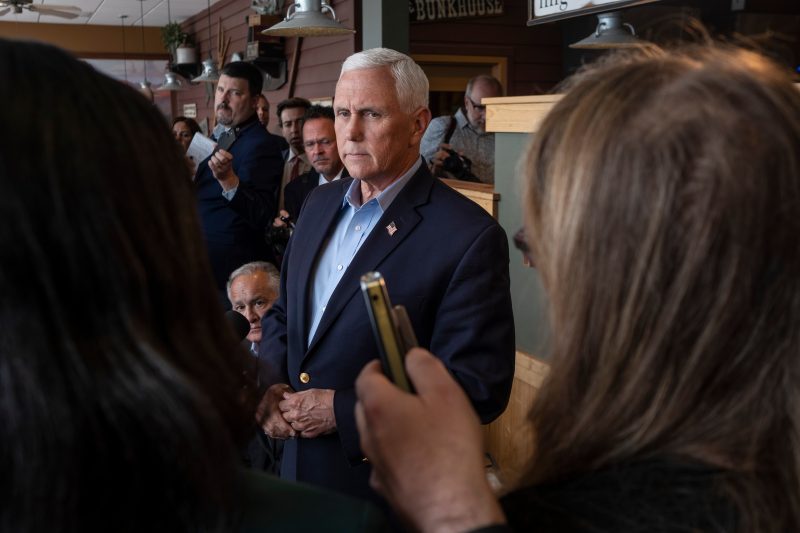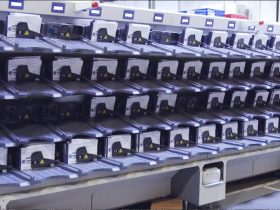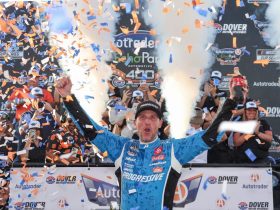Former vice president Mike Pence’s extensive grand jury testimony, a historic rebuke of a former president detailed in the sweeping indictment of Donald Trump released this week, sparked new tensions in the Republican presidential race, with the once-loyal Pence sharpening his criticism of his former running mate and drawing stern blowback in his long-shot bid.
The day after the Justice Department released the 45-page indictment that detailed Trump’s unsuccessful efforts to pressure Pence to reverse his 2020 loss, Pence told reporters in Indiana that the former president was “surrounded by a group of crackpot lawyers that kept telling him what his itching ears wanted to hear.” Shortly after the indictment was released Tuesday, the former vice president — who was referenced repeatedly in the charging document — issued a statement saying that Trump had put himself over the Constitution and that his rival’s “candidacy means more talk about January 6th and more distractions.”
Trump, after taking a comparatively softer tone about Pence at a rally over the weekend, criticized Pence on his Truth Social website Wednesday, noting the former vice president’s struggles to gain traction in the race. “I feel badly for Mike Pence, who is attracting no crowds, enthusiasm, or loyalty from people who, as a member of the Trump Administration, should be loving him,” he wrote.
The exchange marked the latest chapter in a remarkable fissure between the two men, whose political trajectories have diverted sharply since Jan. 6, 2021, when a pro-Trump mob violently stormed the U.S. Capitol in an attempt to interrupt the certification of the 2020 presidential election, over which Pence presided. Until that day, Pence had largely been a loyal backer of Trump.
Now, Trump is the clear polling leader for the Republican nomination even as he faces growing legal jeopardy, while Pence is mired in the single digits and has yet to qualify for the first televised debate. His fundraising has been anemic compared with several rivals, he has drawn boos at some events, and his own allies attribute some of his political problems to Trump’s repeated false claims about the 2020 election.
While he raised it in blunt terms in his launch speech, Pence hasn’t made Jan. 6 a key focus of his campaign. But as he mounts a historically rare challenge of a president under whom he served in the No. 2 slot, his unique role in Trump’s legal entanglements, as a key witness, adds another extraordinary layer to the competition.
Pence said he was optimistic about his ability to contrast himself with the other candidates in the field at the debates, where he plans to cast himself as the most experienced candidate with the most consistent, conservative record. Making the debate stage could prompt questions for other candidates about Jan. 6 and his conduct that day — a topic many have been reluctant to address. Trump has not committed to debating, leaving doubts about whether the two will meet onstage.
Some Pence allies have been open about the frosty relationship between the two men, who haven’t spoken since the summer of 2021, according to a Pence adviser.
“The way I look at it — it was a great partnership with a terrible ending,” said Marc Short, a top Pence adviser. “The former president misrepresented a lot of things to the American people about Mike’s authority and lack thereof. Mike believes strongly in reconciliation and forgiveness. The president then went back into misrepresenting Mike’s role and deeper conspiracies about the rioters on Jan. 6, that there is a sense: What’s the utility in continuing to have the conversation?”
The 45-page indictment details the extent to which Trump pressured Pence to overturn the election results, revealing that Pence took “contemporaneous notes” in the lead-up to Jan. 6 and detailing several private calls between Trump and Pence. According to the indictment, Pence told prosecutors that Trump pressured him in at least four calls — including one on Christmas Day 2020 — to help him overturn the election. He even threatened to publicly attack him if he did not, and Trump advisers repeatedly pressured Pence’s aides as well, the indictment alleges.
Pence’s team was questioned months before the former vice president, and most of the material was known to prosecutors before Pence came before the grand jury earlier this year. But Pence’s recollections of some calls were important because they were without any staff from the vice president’s office, meaning Pence was the only one on their end who knew what was said, Pence advisers said. Pence’s notes were not shared with the congressional committee that investigated the Jan. 6 attack, giving federal investigators new information.
In private, Trump has been unwilling to criticize Pence in the way he often criticizes other advisers and rivals he views as disloyal, according to people with knowledge of the situation, who like some others interviewed for this article spoke on the condition of anonymity to describe private conversations.
“He’s a good man,” Trump has said, according to an adviser who spoke with him about Pence earlier this year. In contrast, Trump is often more critical of Short. He also does not view Pence as a threat politically, two advisers said.
Publicly, Trump has at times pointed out his rival’s lack of support in the polls. “Mike Pence is at 5,” Trump said during a weekend rally in Erie, Pa. The crowd started to boo, and Trump shook his head. “No,” he said. “It’s sad, and I don’t like to see the way he’s being treated. But Mike is at 5,” he added.
In the days after Jan. 6, Pence and Trump met for several hours and “there was a sense of reconciliation about that horrific day,” Short said. But within a couple of months of that meeting, Short said, Trump began to “adopt language he used prior to Jan. 6 in misrepresenting what the vice president’s role on that day was” and Pence “felt it was less productive to continue those conversations.”
Pence privately acknowledged after leaving the White House that his decision to certify the 2020 election results would hurt him politically in the short term. Pence’s team has agreed to cooperate with the prosecutors but has sought to portray the situation as one in which it is simply being forced to cooperate — partially because it does not want backlash from Republican voters, according to people close to him.
The former vice president has questioned whether Trump’s actions qualify as criminal but said recently that Jan. 6 does not come up often on the campaign trail. One Pence adviser said that there was an expectation that he would be featured prominently in the indictment but noted that much of what was included was in Pence’s book.
“Jan. 6 was always going to be a cloud hanging over this election cycle, so I don’t know that the indictment really changes that,” the adviser said, adding that his statement following the indictment “was really issued irrespective of whether there was an indictment or not.”
During a speech at the Indiana State Fair on Wednesday, Pence did not mention Trump. Instead, he spoke about fighting inflation and how he would change President Biden’s economic policy by reducing spending, making the Trump administration tax cuts permanent and overhauling entitlement spending. He appeared to make only a subtle reference to news of the indictment, vowing “to keep talking about what the American people are talking about, not what’s fashionable for the day, not what’s news of the day.”
But he was more critical under questioning from reporters, and he reiterated to donors in a Zoom call later in the afternoon that he did not think Trump was qualified to be president.
“Anyone who puts themselves over the Constitution should never be the president. Anyone who asks anyone else to put themselves over their oaths to the Constitution shouldn’t be president again,” Pence said.
“I don’t know whether the government can make a case beyond a reasonable doubt of illegal conduct here,” he added. “Our country is more important than any one man, and our Constitution is more important than any one man’s career.”
During the call, Pence repeated many of his catchphrases, including, “I’m a conservative, but I am not in a bad mood about it,” and “I can’t say I love politics, but I love people.” And he pointed to policy contrasts he has sought to draw with Trump.
“Frankly, Donald Trump’s position is identical to Biden’s — he won’t even talk about common-sense solutions to Social Security. … I think those differences will come into high relief when I make the debate stage,” Pence said.
In the same call with donors, his campaign manager Steve DeMaura said that the campaign had received donations from about 30,000 of the 40,000 people needed to qualify for the first debate, with a strategy that relied on more than 1 million pieces of direct mail. “By the end of next week, we will be qualified for this debate,” DeMaura said. “The strength in the operation of our grass-roots fundraising has improved by the day.”
Mike Ricci, a spokesperson for Committed to America, the super PAC backing Pence, said the group saw an uptick in donations following the public release of the indictment.
“From the Pence perspective, Jan. 6 was a moment when Mike Pence showed presidential leadership, and that is ultimately what this is about or what it’s supposed to be about,” Ricci said. “It would be interesting to say the least to hear his opponents answer how they would have handled it if Donald Trump tried to pressure them.”
Maeve Reston and Isaac Arnsdorf contributed to this report.








